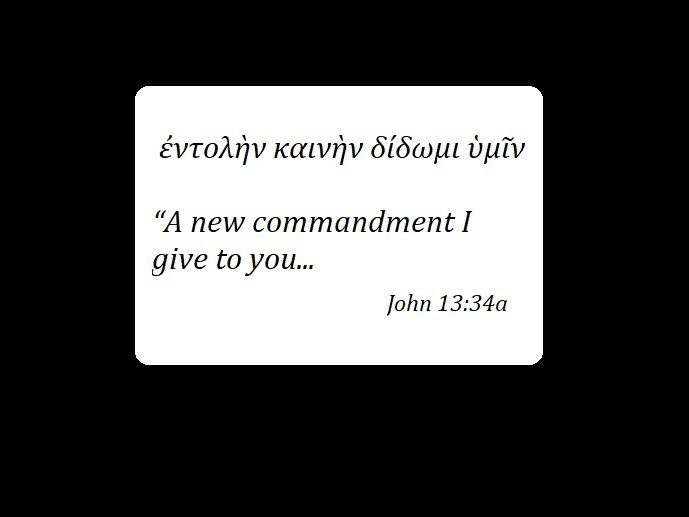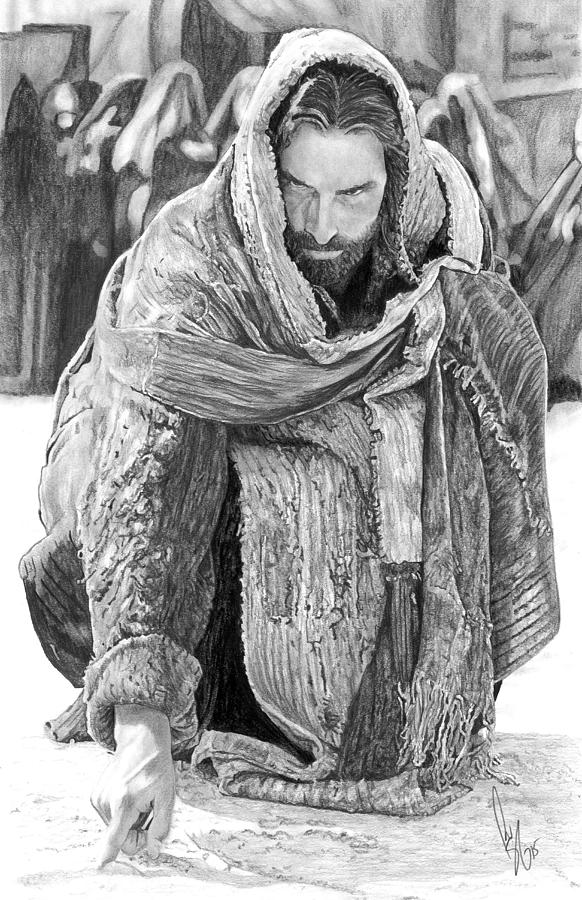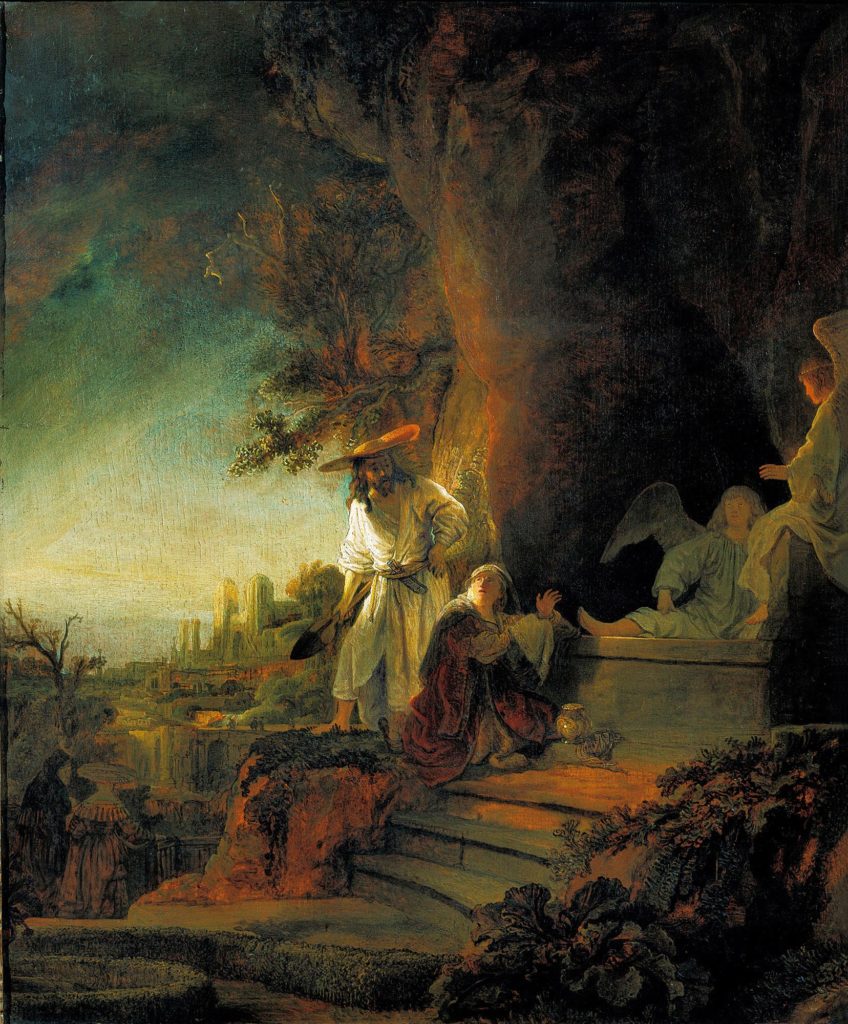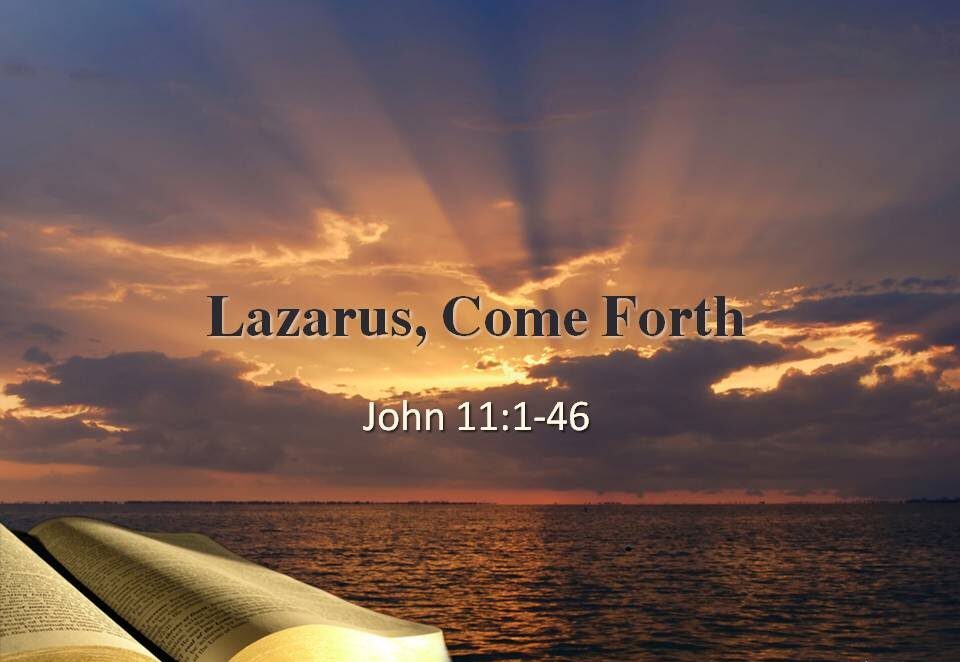While we must wait…
Life has not been progressing even remotely how we had planned.
Here we are locked up as if in the prison of death. All normal life interrupted by events of recent days. Yet what next — what now?
For the church in the year of our Lord, 2020 of these last days, it was Easter we could not celebrate in our familiar gathering of all who believe (as well as some who would like to hope in something other than death).
In the first century, this waiting by the Apostle Thomas to see Jesus once more was somewhat different. For the other Disciples had given reliable first-hand witness of the Good News of the resurrection of the Messiah Jesus, their friend and Lord!
In case you missed their perspective of Jesus’ DEATH and Resurrection, you might briefly look back.
THE DEATH & RESURRECTION OF CHRIST
Many of us have recently taken an entire day to worship the Lord Jesus on Resurrection Sunday or Easter Sunday.
We have watched (even online) a sermon entirely dedicated to the Gospel of Jesus Christ being raised by God the Father from the tomb after His Sacrifice — His real and human suffering in the flesh –His sacrificial spilling of His Blood on the Cross for our sins.
He IS risen indeed!
Yet what now? What in this long time of waiting will happen next? God only knows.
And what, for Christ’s sake (yes, for the Messiah’s sake), must we do?
Waiting AFTER the Resurrection
DEATH cries out! from many perspectives
My own study of the Gospel of John in the year of our Lord, 2020, has reached briefly into the doubting thoughts of all concerning death and what does follow.
Today is the eighth day since Thomas received the reliable Good News that Jesus had appeared to the other Disciples after DEATH.
The Apostle Thomas must have greatly anticipated the time (whenever it might finally come) to witness the risen Lord Jesus in person. (Most of us know the story already mentioned from the Gospel of John.)
It’s just been eight days of the fifty days during which the risen Lord Jesus bodily appears at various times to more than 500 witnesses. For Thomas, just about six more weeks to once again personally see and hear the Lord, the Son of Man risen from the grave.
If you follow talkofJesus.com did eight days seem like a long wait after the rapidity of the events leading up to the Crucifixion and Resurrection of Jesus?
And if you’re anything like me (and likely Thomas) even eight days, thirty or forty days must seem like an eternity. Remember, it is not.
Today we take not the liturgical path leading to Pentecost, the chronological path of detailed witness of the Apostles, nor do we simply return to what we did before, recognizing that things have changed since we planned our year.
Like Thomas and the Disciples, we did not come to this day anticipating it to be any different than the last three years.
Life changed for the Apostles once Jesus rose from death.
And now life changes for the 21st century church caught in a diaspora of faith and witness.
Roger Harned talkofJesus.com
Acts of the Apostles
All seems lost for the Lord’s chosen Disciples once Jerusalem’s religious authorities and powerful Roman governor crucify the Messiah Jesus. Even those who had believed, been healed and followed Jesus to Jerusalem’s gates were left in despair. But then prophecy is fulfilled.
The Sacrificial Lamb for our sin completes that for which the Son of Man was sent by God the Father.
Jesus IS risen!
After instructing the Disciples to take the Gospel into all the world, He ascends into the heavens from which He came. He will return once again in glory at the end of the age!
Those same men who sought to preserve their own flesh by cowering behind locked doors now boldly witness the risen Lord Jesus in the public place.
All the Apostles would eventually be martyred for their witness of Jesus Christ, except John (though he would be tortured and exiled). For now and until their earthly deaths the Apostles’ witness and preaching, emboldened by the Spirit of God, convicted sinners and attracted believers by faith in the Lord Jesus.
Peter and the Apostles, filled with the Holy Spirit of the Lord God, preach to the crowds in the Jerusalem!
The crowds are amazed, then Peter directs his preaching directly to the Jews, a remnant of faithful Jews recognizing the fulfillment of prophecy in what they have just witnessed.
Acts 2:
‘In the last days,’ God says,
Acts 2:17 NLT, quoting Joel 2:28
‘I will pour out my Spirit upon all people.
Your sons and daughters will prophesy.
Take now to heart, fellow 21st c. believer, that which Peter preached to those who had not seen the Lord raised from death on the Cross.
Most had not been among the more than five hundred to witness the risen Christ Jesus, before His ascension on Pentecost just a few days prior to Peter’s preaching.
23 But God knew what would happen, and his prearranged plan was carried out when Jesus was betrayed. With the help of lawless Gentiles, you nailed him to a cross and killed him. 24 But God released him from the horrors of death and raised him back to life, for death could not keep him in its grip.
Isolated, then sent out
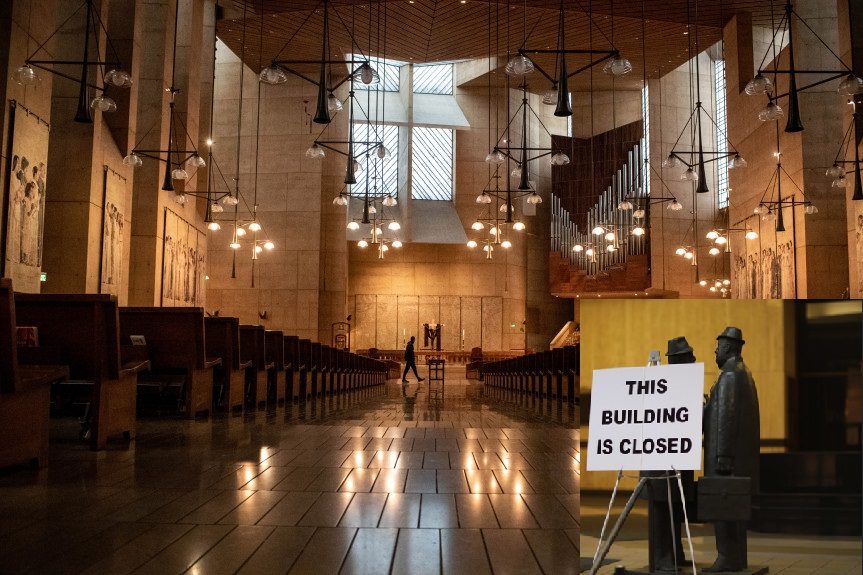
Do you suppose that the locked doors of your church surprise God?
Could the Lord have a purpose in all of this — a purpose central to the Gospel of Jesus Christ crucified, buried, risen and returning again in glory?
Of course God knew it! – the Lord God knows everything that has happened and will happen, even those unseen things which require our faith and glorious things beyond our grasp.
Peter now recognizes this through the Holy Spirit of God, the same Holy Spirit he witnessed in Christ Jesus our Lord.
God the Father and the Son of Man are ONE in the Same with the Holy Spirit!
And Peter preaches the GOOD NEWS with anointed confidence to those with ears to hear.
Son of David, Son of God!
31 David was looking into the future and speaking of the Messiah’s resurrection. He was saying that God would not leave him among the dead or allow his body to rot in the grave.
“God raised Jesus from the dead, and we are all witnesses of this.
33 Now he is exalted to the place of highest honor in heaven, at God’s right hand. And the Father, as he had promised, gave him the Holy Spirit to pour out upon us, just as you see and hear today.
34 For David himself never ascended into heaven, yet he said,
‘The Lord said to my Lord,
“Sit in the place of honor at my right hand
until I humble your enemies,
making them a footstool under your feet.”’
36 “So let everyone in Israel know for certain that God has made this Jesus, whom you crucified, to be both Lord and Messiah!”
37 Peter’s words pierced their hearts…
His words pierced their hearts
Do they pierce yours?
Does the Gospel of Christ Jesus, sent to save sinners from death ring out to the crowds beyond the locked doors of a church building where once you gathered?
A response of faith
… and they said to him and to the other apostles,
“Brothers, what should we do?”
What must we do?
If now the Holy Spirit finally pierces our own tech-brittled 21st century hearts, what is our response while we wait for the LORD’s return?
Or even our response in this brief time before our own inevitable DEATH?
For like this time of waiting for the Apostles, this life will no longer be the same for you and me.
A former perspective of Church
We have put on our ‘Sunday best’ for Easter for all these years. And we call ourselves, “Christian.” (Always from within the walls of our ‘church,’ and occasionally even in this world where we live, work and play.)
What witness of Jesus yet resounds in the hearts of those who hear us claim — the Holy Name of the Lord?
For they no longer may enter the building of our gathering, the place to which we once gladly invited:
“Let’s go to church.“
It seems that everything has changed and our vision for the church building no longer applies.
Could a prosperous and comfortable church of these recent centuries have wandered aimlessly into a by-path meadow? It has remained an enduring challenge to the church.
May God’s Grace preserve you from straying into Bypath Meadow!
The man who professes to be a Christian must not expect God’s angels to keep him if he goes in the way of worldliness. There are hundreds, and I fear thousands, of church members who say that they are the people of God, yet they appear to live entirely to this world. The great aim is moneymaking and personal aggrandizement—just as much as it is the aim of altogether ungodly men.
C. H. SPURGEON, AT THE METROPOLITAN TABERNACLE, NEWINGTON, ON LORD’S-DAY EVENING, AUGUST 22, 1875.
The World’s Perspective of the 21st C. ‘church’
The Acts of the Apostles witnesses the boldness of the early church even in the face of DEATH for their confidence and love in Christ.
Unbeliever you know in this 21st century world of chaos look near and far for an example of men and women who exemplify the ‘god’ we claim by the witness of our lives.
We tell some that Jesus died on a Cross for our sins.
While our witness makes them wonder of YOU ‘so love the world’ that YOU would die for THEM.
‘Where is the Christian who does not fear death,’ they ask?
Yet when some agendized so-called ‘christians’ act boldly in ways repugnant to their own ideals, good-seeking souls of this world ask,
‘Why would I want to be a fool like THEM?’
IF GOD SO LOVED THE WORLD, WHY DON’T I SEE IT IN CHRISTIANS?
- THEY are after our money to build their grand cathedrals of prosperous vanity.
- How are their corporate jets any different than those of the world’s great philanthropists who would save our world for another generation?
- Are these so-called ‘christians’ banned from their big gatherings any better than the man isolated in a cave or on a mountaintop?
- Really, are Christians any different than me?
Fair questions of the world to any who claim faith.
In our witness they observe a discrepancy between claim of Christ and our inability to differentiate between you and the world, because of Christ.
Assuming God (against Whom the world rebels), how must those obedient to the Lord act when the world seemingly slips rapidly back into the chaos preceding creation?
Fortunately, scripture provides not only answers, but also direction. For we are SINNERS LIKE THEM seeking justice, yet offering solace in LIFE after DEATH.
Are you the Christian who fears not DEATH (yet is no fool)?
Proverbs & Prophecy
When the wicked die, their hopes die with them,
Proverbs 11:7 NLT
for they rely on their own feeble strength.
Evil people get rich for the moment,
Proverbs 11:18-19 NLT
but the reward of the godly will last.
Godly people find life;
evil people find death.
We find that those who do not believe may well accept the comfort of Scripture as hope for their own future. Proverbial advice, however, need not come exclusively from scripture.
Others may have it right as well, so our random words of wisdom from scripture may make no more difference than those from a worshiper of stone living in the lies of idolatry. The Lord our God is One!
The Prophet Isaiah, who we so often quote concerning the Messiah of God also promises a glorious future:
Behold, a king will reign righteously…
No longer will the fool be called noble,
Or the rogue be spoken of as generous.For a fool speaks nonsense,
Isaiah 32:1a,5-6 NASB
And his heart inclines toward wickedness:
To practice ungodliness and to speak error against the LORD,
To keep the hungry person unsatisfied
And to withhold drink from the thirsty.
Tell those of the world who speak sense that you know this One Righteous King.
“He existed in the beginning with God. And “God created everything through him.
How they will know
Do you, beloved brother or sister in Christ, recall Jesus’ last command to the eleven after Judas left them to betray the Lord?
It would be for this time of waiting by the Disciples who must endure during the trying times of Jesus’ crucifixion.
One way to look at the timing and importance of the Lord’s ‘new commandment’ to the Disciples might be to rephrase it to say something like:
If you don’t remember anything else of what I have taught you, remember this…
DO YOU?
AND does Jesus New Command to His Disciples apply to the CHURCH while we await His return in glory?
John 13:
33 Little children, I am with you a little while longer. You will seek Me; and as I said to the Jews, now I also say to you, ‘Where I am going, you cannot come.’
“A new commandment I give to you, that you love one another, even as I have loved you, that you also love one another.
John 13:34 NASB
35 By this all men will know that you are My disciples, if you have love for one another.”
Does the church obey this new commandment of Jesus?
IF YOU HAVE LOVE FOR ONE ANOTHER…
Is this not the witness of Christ which builds His CHURCH — soul by sinful redeemed soul?
Has the world not seen our white-washed building without seeing Christ?
“Go into all the world,” the Lord commanded the disciples. Yet Jesus never suggested that we bring all of the world into our building of worship.
Let your hearts, imprisoned in cells away from each other, hear what the Lord through Scripture says to the Church.
For when once more we gather together, to ask the Lord’s blessing, perhaps those wandering lost souls of our neighbors will see that Christ’s Church is in fact, us.
Amen.
